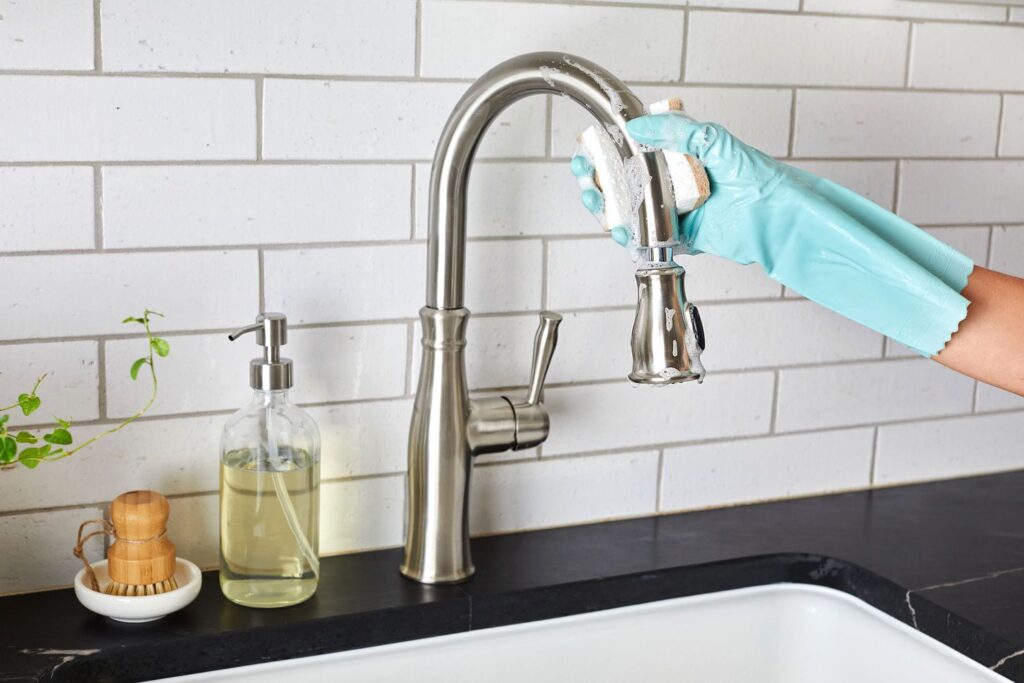
kitchen sink
Your kitchen sink is an essential part of your home. It’s where you wash dishes, fruits, vegetables, and hands. But it can also be a breeding ground for bacteria if not maintained properly.
Washing dishes and utensils after each meal is the best method to maintain a clean atmosphere in your kitchen. Clear out all food scraps from your kitchen sink and clean the strainer. It will remove the clog and restore the normal functioning of your sink. Once you remove any remaining grease or oil, you may rinse it off with warm water after washing it with mild soap and warm water.
If you still see any stains, scrape the area in a circular motion with baking soda or rinse the sink with white vinegar. Baking soda will bubble and, as a result, remove the stains. Finally, run some warm water through the sink. Add a drop of lemon or lavender oil to a piece of cloth and massage the sink surface with it if you want to go the additional mile. This technique helps maintain your kitchen sink clean and sterile throughout the day while leaving a lasting scent. When washing your kitchen sink, put on rubber gloves to protect your hands from grime. Also, hiring the best local plumber is still the best way to get rid of a prolonged clogged sink.
If you have a different sink type and want to fix the clogged situation, read on to find out how!
1. Ceramic Sink
For sinks in bathrooms and kitchens, ceramic is a typical material. If not cleaned correctly and frequently, this material can become filthy quickly. Baking soda and lemon is a quick and easy technique to clean a porcelain sink. Sprinkle baking soda over the ceramic sink after lightly wetting it with water. If there is any standing water, ensure it is gone, or the baking soda will dissolve. Scrub the whole surface, paying attention to the soiled areas, using a moist sponge. Clean it off with some warm water. Next, squeeze some lemon juice onto the sink and give it at least 30 minutes to sit. Now thoroughly wash it with water. For the best results, use at least four to five lemons.
2. Stainless Steel Sink
Use baking soda and lemon juice to clean a stainless steel sink. Use the mixture to scrub the sink well, then rinse it. The professionals use one part of hydrogen peroxide and three parts of tartar if the stains are too difficult to remove. Use a gentle cloth or sponge and gently rub the surface. Your stainless steel sink will sparkle like new after thorough rinsing. Use these chemicals only when natural solutions can eliminate the stains due to their toughness. Your stainless steel sink will no longer have watermarks if you smear some white vinegar around the walls. Voila! Your water stains will go quickly.
3. Granite Sink
Cleaning your granite sink after every usage can help to keep it immaculate. You may use soap, water, and a sponge for everyday cleaning. After giving it a gentle circular motion, thoroughly rinse it with water. Use a dry towel to clean the surface to remove any remaining water spots, limescale, or stains. Spray the concoction over the sink to thoroughly clean it by combining equal parts water and vinegar in a spray bottle. Gently scrub it, then thoroughly wet it. Try to do this once every two weeks to have a clean, fragrant kitchen.
4. Kitchen Sink Drain
If you don’t clean your kitchen drainage pipes thoroughly, an unpleasant odour may result. Flushing your kitchen drain with hot water at least once a week is the simplest method. Boil some water, add dish soap to it, and then gently and carefully pour the mixture down the drain without spilling. After a few minutes, add some cold water. It will aid in clearing the drain of any junk. Pour hot water to completely clean the pipes and flush out any dirt or debris. This procedure prevents your kitchen drain line from clogging and keeps bacteria and odour at bay.
5. Kitchen Drain Pipes
You may unclog your kitchen plumbing by following these basic instructions. First, empty your sink of all standing water. Down the drain, pour one cup of baking soda. The drain should now get covered after adding a cup of white vinegar to the hole. Open the drain after fifteen minutes, then pour some hot water down it. This technique aids in rapidly clearing your drain and dissolving obstructions.
Quick Tips to Maintain Sink Cleanliness
1. Rinse it Out Regularly
First, rinse out your sink after every use. It will help prevent food particles from building up and becoming a breeding ground for bacteria. Use hot water and a mild detergent or cleanser to get it as clean as possible. You may also want to use an antibacterial spray or cleaner to help eliminate germs in the crevices of the sink bowl.
2. Scrub Away Stains
If you have stains in your sink, try scrubbing them away with baking soda or natural abrasive cleaners. Baking soda is especially effective at removing food stains, while natural abrasives work well for hard-to-remove soap scum or mineral deposits from hard water spots.
3. Use White Vinegar
White vinegar is an excellent all-purpose cleaning agent that can be used on many surfaces, like sinks made of stainless steel, porcelain, ceramic, granite, and more! Mix equal parts white vinegar and water in a spray bottle and spritz onto the sink surface before wiping down with a soft cloth or sponge. Remember to rinse afterward with clean water!
Connect with Mornington Jetting for Best Sink Cleaning Solutions
Keeping your kitchen sink clean doesn’t have to be challenging; all it takes is regular maintenance and care! To ensure optimal hygiene standards in this area, try implementing these seven simple tips as part of your routine cleaning regimen today; you’ll be glad you did when everything looks nice & shiny tomorrow). With these tips, we hope you feel better equipped when it comes time to tackle those challenging kitchen cleaning tasks. But if you don’t want to practise these all and want a quick result, get in touch with our Mornington Jetting plumber for the best plumbing solutions.



